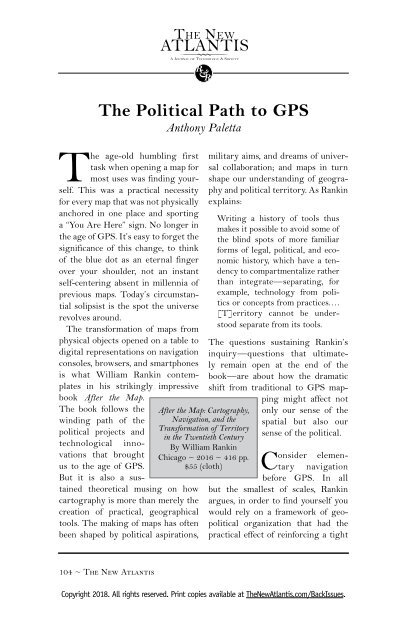The New Atlantis - Winter 2018 (Issue 54) uncompressed with cover
Create successful ePaper yourself
Turn your PDF publications into a flip-book with our unique Google optimized e-Paper software.
R &<br />
R<br />
<strong>The</strong> Political Path to GPS<br />
Anthony Paletta<br />
<strong>The</strong> age-old humbling first<br />
task when opening a map for<br />
most uses was finding yourself.<br />
This was a practical necessity<br />
for every map that was not physically<br />
anchored in one place and sporting<br />
a “You Are Here” sign. No longer in<br />
the age of GPS. It’s easy to forget the<br />
significance of this change, to think<br />
of the blue dot as an eternal finger<br />
over your shoulder, not an instant<br />
self-centering absent in millennia of<br />
previous maps. Today’s circumstantial<br />
solipsist is the spot the universe<br />
revolves around.<br />
<strong>The</strong> transformation of maps from<br />
physical objects opened on a table to<br />
digital representations on navigation<br />
consoles, browsers, and smartphones<br />
is what William Rankin contemplates<br />
in his strikingly impressive<br />
book After the Map.<br />
<strong>The</strong> book follows the<br />
winding path of the<br />
political projects and<br />
technological innovations<br />
that brought<br />
us to the age of GPS.<br />
But it is also a sustained<br />
theoretical musing on how<br />
cartography is more than merely the<br />
creation of practical, geographical<br />
tools. <strong>The</strong> making of maps has often<br />
been shaped by political aspirations,<br />
R<br />
R<br />
After the Map: Cartography,<br />
Navigation, and the<br />
Transformation of Territory<br />
in the Twentieth Century<br />
By William Rankin<br />
Chicago ~ 2016 ~ 416 pp.<br />
$55 (cloth)<br />
military aims, and dreams of universal<br />
collaboration; and maps in turn<br />
shape our understanding of geography<br />
and political territory. As Rankin<br />
explains:<br />
Writing a history of tools thus<br />
makes it possible to avoid some of<br />
the blind spots of more familiar<br />
forms of legal, political, and economic<br />
history, which have a tendency<br />
to compartmentalize rather<br />
than integrate — separating, for<br />
example, technology from politics<br />
or concepts from practices....<br />
[T]erritory cannot be understood<br />
separate from its tools.<br />
<strong>The</strong> questions sustaining Rankin’s<br />
inquiry — questions that ultimately<br />
remain open at the end of the<br />
book — are about how the dramatic<br />
shift from traditional to GPS mapping<br />
might affect not<br />
only our sense of the<br />
spatial but also our<br />
sense of the political.<br />
Consider<br />
elementary<br />
navigation<br />
before GPS. In all<br />
but the smallest of scales, Rankin<br />
argues, in order to find yourself you<br />
would rely on a framework of geopolitical<br />
organization that had the<br />
practical effect of reinforcing a tight<br />
104 ~ <strong>The</strong> <strong>New</strong> <strong>Atlantis</strong><br />
Copyright <strong>2018</strong>. All rights reserved. Print copies available at <strong>The</strong><strong>New</strong><strong>Atlantis</strong>.com/Back<strong>Issue</strong>s.


